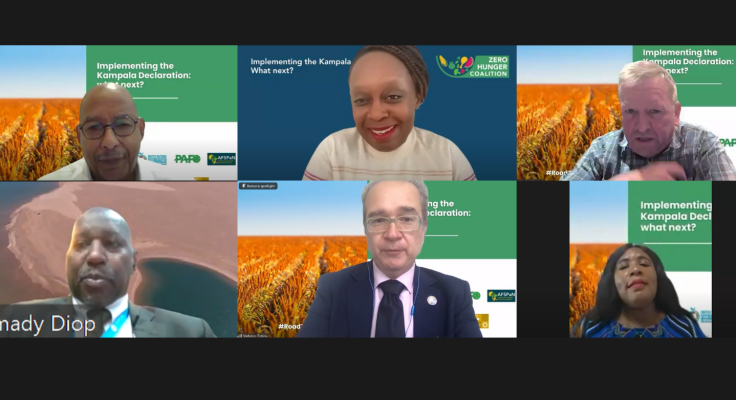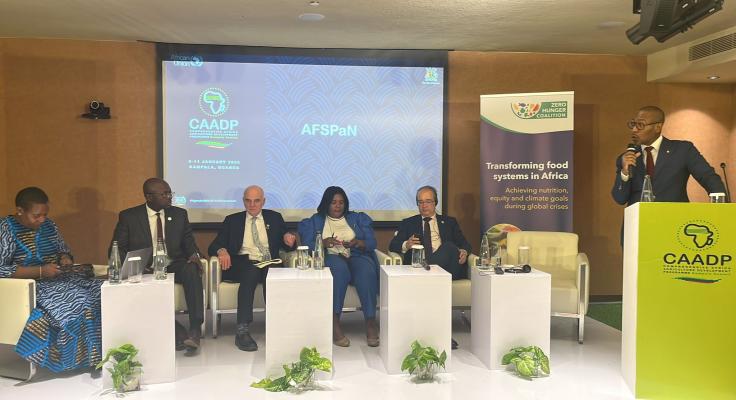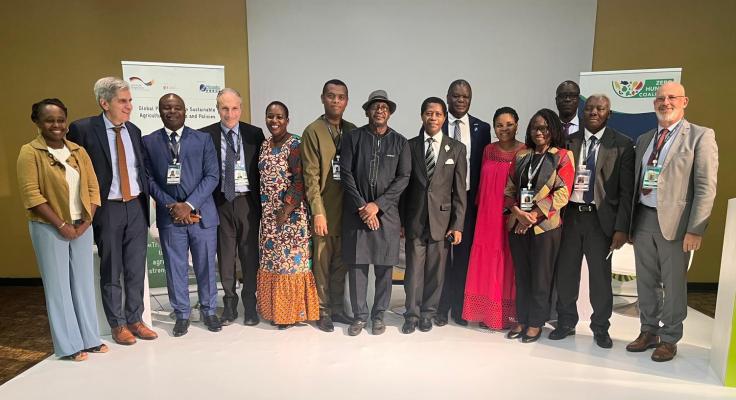
The role of Parliamentarians to end hunger in Africa
The African Food Systems Forum continues to be a flagship event, bringing together brilliant, committed and determined minds, from around the world, with a singular purpose – not just to end hunger and poverty once and for all on our continent, but to truly to transform the lives and futures of our people.
In pursuing this monumental ambition, we are reminded of how far we have come. We are reminded of the generations before us, whose sacrifices and resilience in the face of perilous odds, have made it possible for us to stand here today – confident – that no matter the scale of the challenges and adversity that we may face, our resolve will always be stronger. This not based on the strength of any single individual, but on the power that is ours collectively.
Nowhere is this clearer, than in the context of our present efforts to transform our food systems. We understand that this is a fight for an Africa that is food secure, well-nourished and healthy; where livelihoods from farm to fork (and back) are sustainable, equitable, and acquired through decent work; where value-chains and intra-African trade are sources of inclusive growth, increased integration, and real opportunities for all; in which the environment is protected and natural resources sustainably managed; and whose resilience is ensured in the face of climate change and its many nefarious effects.
This is a fight that no individual – powerful or wealthy as they may be – can win on their own. Nor is it one that we can win through the silo mentality that continues to pervade our efforts when it comes to implementing those policies that look so perfect on paper but continue to yield insufficient results.
Today is not about doom and gloom. On the contrary, the event that brought us here, in the beautiful city of Kigali, should first and foremost be a celebration of all that has been accomplished – not least of which the strides we have made in our understanding, from an issue primarily focused on agriculture, to one concerning systems that touch nearly every aspect of our lives.
The notion that transforming our agrifood systems is a matter of building partnerships, coalitions and synergies, with the aim of turning common understanding into common purpose, and addressing holistically, the many challenges we face to achieve the Africa that we want, are our key motivations for creating the African Food Systems Parliamentary Network.
To be sure, our network is founded on the belief that Parliamentarians have been an importantly missing link between the policies of CAADP and how these translate into transformational change and desired impact on the ground.
As legislators, as custodians of national budgets, as controllers of executive action, and as representatives of diverse people in our constituencies and countries, we have understood that the role of Parliamentarians is necessarily critical: in informing and mobilising stakeholders, in providing enabling environments through law, in ensuring that national public spending consistently aligns with long-term investment plans, and in strengthening accountability throughout these processes.
This is at the heart of the recommendations formulated by our network in its Position Paper for the Post Malabo agenda, submitted to the African Union in the context of the Technical Working Group consultations, recently held in Lusaka and Kampala. We are delighted to see that these recommendations have been, in large part, integrated in the draft CAADP Strategy and Action Plan recently published by the African Union Commission – most notably those recommendations regarding the recognition of a formal and official role for Parliamentarians in the context of Pillar 6: strengthening Agrifood systems’ Governance.
This will mean that Parliamentarians, across legislatures, will remain informed of the processes, progress and priorities related to the transformation of agrifood systems at national and sub-regional levels. It will also mean that accountability would no longer solely be considered on a macro-scale at national level, but also in a way that is more directly linked to tangible impact at sub-national levels.
Moreover, in better understanding the imperatives and multiplier effects, of targeted public investments, for the transformation of agrifood systems, Parliamentarians may finally help our States achieve and even perhaps supersede the elusive goal of 10% of national budgets allocated to agriculture and food systems transformation.
This, of course, will not solve all our problems, and certainly there is still much more work to be done, not just by Parliamentarians but by all of us. For our part, the African Food Systems Parliamentary Network will continue to advocate, alongside all of you and with your help, for greater coherence in our respective policies and actions, and end to the silo mentality that often makes our efforts counterproductive.
Furthermore, we will continue to advocate for significant and qualitative investments and radical improvements in the data collection and dissemination capacities of our countries – namely, more inclusive and frequent processes for generating, validating and disseminating the data published in the context of Biennial Reviews – mindful of the fact that timely, accurate and transparent data is the key to evidence-based decision-making and the insightful tracking of outcomes.
Finally, AFSPaN, together with our partners, will continue our efforts to mobilise and inform Parliamentarians – creating opportunities for peer learning and knowledge sharing, as well as for capacity development in exercising the 4 core functions that are legislating, budget-setting, representation and oversight, in view of cementing their potential role as Champions and allies for the transformation of agrifood systems in Africa.
And so, as we embark on the next chapter of CAADP, with 20 years of experience and a firm resolve to make this a decisive decade for agrifood systems on our continent, it is critical for us to understand that our greatest challenges are not intellectual, technical or even financial, but political. It will not be enough to rest on our laurels and assume that the right thing to do will necessarily be what is done. We must continue to fight, to explain, to convince, to collaborate and to compromise until we succeed in making hunger, malnutrition, poverty and all the other afflictions concerned, a thing of the past in Africa.



